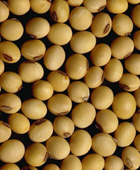Soy No Help To Women With Cardiovascular Disease:

An interesting study posted in this month’s American Journal of Clinical Nutrition lends more fuel to the fire about the non-value of unfermented soy products in terms of protecting postmenopausal women from cardiovascular disease (CVD).
Researchers at Iowa State University conducted a double-blind study on 55 women over six weeks to determine if consuming the isoflavones and phytate contained in soy protein would lower their personal oxidative stress index. Women were given 40-gram packets of soy protein they could use to make smoothies or add with their daily meals. Scientists were also curious to find out if a higher intake than recommended by the FDA (25 grams daily) would elicit beneficial effects on blood lipid profiles, as well as on oxidative stress indexes, in postmenopausal women, who are at high risk for CVD.
Not surprisingly, isolflavones or phytate had no significant effect on individual oxidative stress indexes or circulating lipids. Also, total and HDL cholesterol levels weren’t much different between normal- and low-isoflavone groups either.
Good to see there are more studies coming to the forefront shredding the long-standing myth that soy is a “near perfect” food. (One of the biggest concerns: Soy contains phytic acid, which has anti-nutritional properties. Because phytic acid binds with specific nutrients you need, like iron, it inhibits their absorption in your digestive system.)
If you’re not convinced, consider these recent articles and studies I’ve posted that indeed show how regular consumption of processed soy products can actually be harmful to your health:
- The amount of the soy isoflavone genistein, a chemical found in commercial soy formulas, may inhibits the intestinal growth of babies.
- The soy industry may be responsible for suppressing research that links soy consumption to cancer.
- Soy-based foods are no good as a hormone replacement for women.
A reminder: The only soy-based products that are worthwhile to eat are those made from fermented soy, the form that is very popular in many Asian cultures, aiding in preventing and reducing a variety of diseases including certain forms of heart disease and cancers.
American Journal of Clinical Nutrition, Vol. 81, No. 3, 590-596, March 2005